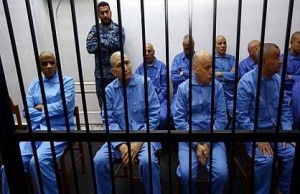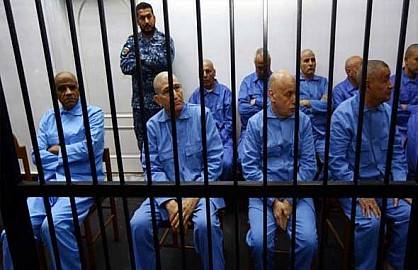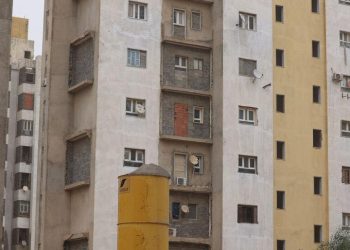By Libya Herald reporters.

Tripoli, May 4 2015
The “final” part of the trial of former leading figures of the Qaddafi regime . . .[restrict]will be held on 20 May, a Tripoli television station has announced .
The trial of up to 39 defendants, including former security chief Abdullah Al-Senussi and Qaddafi’s son Saif Al-Islam, has been going on since April last year, but remains shrouded in secrecy.
Nobody is even sure how many of the defendants are actually on trial, with numbers of those present in recent hearings fluctuating between 23 to 36. No figure was given for those at Sunday’s hearing.
The announcement that the trial was entering its “final” stage came yesterday from Al-Naba TV, but its news report made no mention as to whether this meant a verdict is due, or only that this will be the final hearing of evidence.
The case had originally been billed as a grand calling-to-account for the leaders of the Qaddafi dictatorship, with defendants including former prime minister Al-Baghdadi Al-Mahmoudi and Abu Zeid Dorda, chief of Qaddafi’s external security agency.
Together, they are accused of running one of the world’s most oppressive dictatorships, responsible for forty years of persecution, torture and theft on a grand scale.
In 2013 the International Criminal Court ruled that Libya was competent to hold the trial of Senussi, although it gave no such ruling for Saif Islam because of the failure of the Zintan militia to hand him over to state authorities. Both men were indicted for war crimes and crimes against humanity by the ICC in 2011.
The case, held in a specially-built courthouse in Tripoli’s maximum security Al-Hadba prison, began on 14 April last year amid confusion, with Saif failing to be produced by Zintan for a video link to the trial. Misrata refused to hand over the seven defendants that it was holding, while prosecutors admitted they had no clear information on a further eight accused.
Also unclear is whether a second son of the late dictator, Saadi, extradited from Niger last year, has been added to the case or is to be tried separately.
Last May a UN monitor was detained by militia guarding the prison and accused of black magic. The government later issuing an apology.
In July the onset of civil war saw UN monitors evacuate the capital along with the rest of the UN mission and most embassies.
The conflict has seen the recognised government flee to the eastern town of Tobruk, with Tripoli now controlled by a rival administration, which has styled itself the National Salvation Government.
Since then trial-watchers have had to apply guesswork when they seek to follow the trial proceedings.
These are held periodically by the Tripoli Appeals Court in sessions lasting no more than a day, some of them postponed without hearings, some seeing several hours of evidence heard.
A total of 23 hearings has been held in Tripoli since 14 April. The public is not allowed access, there is no live TV coverage and apparently no publicly accessible record. However, journalists and relatives of the accused have been allowed into hearings, though it is not clear if the court has met at other times without giving public notice.
Unclear also is whether there has been sufficient time, in a trial that has seen only 23 sessions, some of them postponed, to lay out fully the evidence against 39 defendants and then to allow each to present their defence and cross-examine the evidence.
What is known is that the defendants face a wide variety of charges including embezzlement, actions harmful to the nation, murder, looting and incitement to rape. Chief prosecutor Sadiq Al-Sur said last year his evidence was contained within a 4,000-page dossier. This has never been published.
The court has stated that all defendants have lawyers. However, Amnesty International has claimed that there have been cases of intimidation among judges, lawyers and witnesses.
Earlier this year Senussi’s British-based lawyers appointed by the ICC demanded the Hague review whether it was correct to rule, as it had, that Libya was capable of holding a trial that complied with ICC standards.
But ICC chief prosecutor Fatou Bensouda insisted that she has no reason to think the trial is not proceeding according to ICC standards.
[/restrict]








